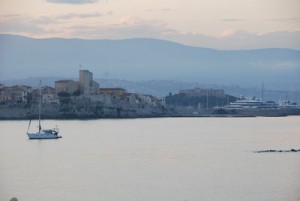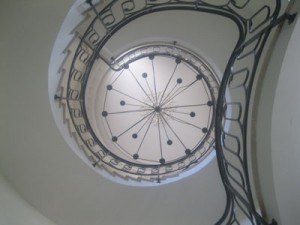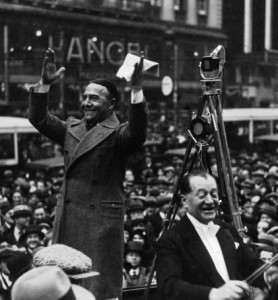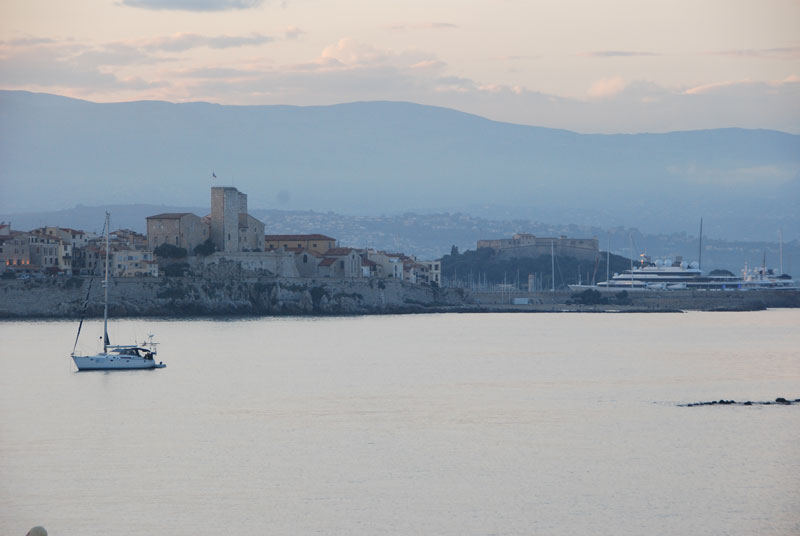It was clear from his first words that Jean Aussel was a charming storyteller – exactly as Emilie, my contact at the Archives Municipales, had predicted.
Jean, his wife, Philippe and I made our introductions in Bellevue’s courtyard. The 80-something man had chosen a proper, long-sleeved, button-down shirt for the occasion despite the early evening’s thick, summer air. His baritone voice, resonating authoritatively yet warmly, complimented the exterior workmanship of our renovated Bellevue.
Jean’s wife was his perfect complement – a trait not uncommon in elderly couples who’ve been together longer than most people have been alive. Delicate, with a fair complexion and careful posture, she wore a white summer dress juxtaposed with a colourful necklace and earrings. Yes, she agreed with Jean’s assessments of Bellevue’s exterior, smiling politely all the while.
But as we stepped over Bellevue’s threshold, it was she who was breathless. Bellevue was beautifully open these days! The entry had been enclosed before…. She merged into the living room, a real-life Alice cascading into the rabbit hole. Memories flooded back. The living room had been the dining room – and there, turning toward today’s dining room – that had been the salon. But there were walls between the rooms.…
Lolo bounded into the room with Sabrina, our au pair. I prayed that “best behavior” would be as evident as it was supposed to be for our special guests. Jean’s wife stooped down to Lolo and asked her age.
“Six ans,” Lolo replied. Relief.
“Voilà! I was ten years old,” she said, “just a bit older than you when I lived here.” Her family, we learned, moved to Antibes from Normandy in order to escape the war. She had more to say, I was sure, but she hesitated, either out of character or politeness or both.
Philippe stepped up as MC. We were very excited to meet them both, he explained – particularly me. I wanted to learn the history of Bellevue. I wanted to learn about her founder. I wanted to write down her stories. Philippe mentioned my blog and (after explaining the concept of a blog) explained that I write about cultural differences between life in France and North America – about things like the rigidity of French classrooms compared with those in North America, or the way the French insist on saying “bonjour” before starting any interaction. Self-deprecation, he added, was always a plus in making these observations.
Jean caught onto the notion straightaway. “Cultural differences – like we’re surprised that a villa like this has shoes right here in the entryway – right out in the open!” he said. “I mean, it’s okay for a casual home, but here, in a nice villa…?”
Philippe delighted that his own personal gripe had been noted by a third party. My husband counted the neat line of shoes under the hallway table. “Fourteen pairs of shoes!” he said. “Fourteen pairs! Two belong to me. The other twelve belong to my wife and six-year-old daughter!”
And that, I explained, hoping to avoid that ongoing line of fire, was the perfect example of what Jean could write about in his own blog about crazy foreign folks who shack up on France’s good soil.
But Jean Aussel was a man of bigger ideas. What interested him at that moment was that we were connecting with local people and forming these insights. “I expect you’ve already started making des racines here,” he said expectantly.
Les racines – roots – are a big deal in France. Particularly among folks whose ancestral roots delve far beneath the Côte d’Azur’s sandy and sometimes transitory surface.
It was at about this point that I mentioned my tape recorder. The couple had no fear of recording their voices. And honestly, it was the only way – despite the painstaking revision – that I could understand all their enthusiastic words.
It was about this time, too, that I realized I didn’t know her name. Jean never offered it, nor did she, and cultural and generational mores somehow prevented Philippe and me from asking. And especially now, as sweet Alice floated further into her rabbit hole that was at once familiar – generating the spark of a faded snapshot – and then, in a single breath, entirely new, a dwelling that was totally disembodied from the space she knew as a child.

We moved onto Bellevue’s main terrace. Philippe explained that we call it our “loge at the opera of life” because honestly, there’s always some activity that we can spy on from the perch: boats and cars and motorcycles and planes, sun worshipers and picnickers, sailors and windsurfers, swimmers and divers and fishermen. And here, something – something among this hive of activity – set off a spark.
“We went fishing for les crevettes…,” Jean’s wife began.
Shrimp? Philippe and I were stunned. Today there were sea urchins – but hardly shrimp!
“Between the rocks – oui, oui, oui,” she said.
There was more. Her parents wanted to buy this house when they moved down from the north to escape the war. “I lived here from 1939,” she said, hesitatingly.
Jean finished her thought as she searched for words. “Her father left the north because he had four children,” he said.
“Et voilà,” she said. Exactly right. “And after, the Italians came to France…”
“The Italians,” Jean interjected, “they were allied with the Germans in the war.”
“They took the house and we had to leave,” she said. “That was 1941 or 1942…. All along the sea, all the houses were requisitioned, and we had to leave. The Italians moved in and the house was mined.”
“Mined?!” Surely I didn’t hear that right. My own mind raced to the builders and gardeners and pool installers who dug deep into Bellevue’s earth. It jumped to playdates in which half-a-dozen kids bounded through the gardens. And, like a good American brain, it rushed straight to the strength of our home insurance policy. All in a couple seconds.
“They put landmines in the garage…,” she said. Her memory was cut short by our clamour on the terrace, making me wonder, belatedly, what other areas of the house she was about to name. And then, as if to make sure we got her point, she said, “If we walked over them, they’d blow up.”
“There was a period,” Jean explained, “when people living on Cap d’Antibes close to the water were evacuated. They didn’t have the right to live here.”

When we headed upstairs, Jean’s wife became disoriented: Her bedroom was gone. Recognition of such a precious fact – the disappearance of one’s own, childhood room – was both slow and, I suppose, heartbreaking in its way. Rooms were smaller and more enclosed in earlier times. Where there’d been four bedrooms, today there were only two. The ceiling above Bellevue’s grand, cylindrical staircase – now rising three full stories – must’ve been a storey lower. The top part of today’s vaulting void was Jean’s wife’s bedroom.
But a second terrace that existed outside her bedroom was unchanged. Its views still must rank among the best on the Cap, sweeping from our own town of Antibes all the way – if you crane your neck – to Cap Ferrat, on this side of Monaco.
The delicate woman was delighted by a sudden memory. “I shelled peas here with my sister! During the war…we were happy!”
On reflection, it’s that last phrase that was so poignant. Something so simple brought great joy during the darkness of war.

She then focused on the sprawling, white house next door, a shockingly modern residence in former days. She often played there with her good friend, the daughter of Georges Milton, a well-known singer and movie actor.
Jean galloped down memory lane, too. Soon we stood on a small balcony overlooking Bellevue’s garden, where his conversation clung to this notion of rootedness that I can’t seem to escape. Jean pointed across the road to La Collinette, a white villa with sea-green shutters. He played there as a child. The house next door? It was bought by his grandfather, a well-known horticulturist. And the house right up there on the hill, peaking out under the parasol pines? Jean was born there. Of course he was.
When we reconvened in Bellevue’s living room, I hoped that Jean Aussel’s nice glass of whiskey might fuel further stories. But it’s her stories that I’m focusing on now, and one of my favourites had to do with the dishes she used as a child. Edouard Muterse had purchased a pretty table service as part of the rental package.
“What’s funny is that I lived in this house, and then I married Jean,” she said, now offering her stories more freely. “He inherited the furnishings that were in this house. So now, the whole set of dishes came back to me!”
Her contributions continued. She returned to northern France with her parents, but after the war her family bought a holiday home in neighbouring Juan-les-Pins. (This town, if I may interject some history, was a hot spot during that era. It was the place that had invented waterskiing and where – if the story is to be believed – Coco Chanel had recently discovered the suntan.) The couple met each other through one of her sisters and married in 1953.
Fueled by the pause, and perhaps by the warmth of the whiskey, Jean began to tell stories about his own family, and to indulge my curiosity, particularly those about Edouard Muterse, the father of Bellevue. At one point, he played on the small-worldliness of this whole episode.
“My wife knew Edouard Muterse before I did,” he said. “She knew my uncle because her parents rented the house.” But there was something else.
“My uncle was trés genereux,” he said. His property Le Bosquet was a very large, wooded property with a separate cottage. He loaned this cottage to the Guides de France, the French Girl Scouts. Jean’s wife was a young member.

She continued the story. “Every Thursday, all the Guides, we’d play at Le Bosquet. It’s like this that I knew his uncle…. It was during the war, and the place was full of fig trees. We were tellement, tellement hungry, and so we stole figs from Edouard Muterse!” She added, “I don’t know whether he suspected or not.”
By the time Jean Aussel and his wife left Bellevue, my tape recorder had registered nearly two hours of conversation. That’s a pretty good indication of how long this blog post could be. So I will leave you, just as she was every Thursday, hungry.
French Lessons is on holiday next week in – of all places given its recent, shocking atrocities – Norway. Bellevue’s tale will continue in the following week with what’s left: Edouard’s story.

